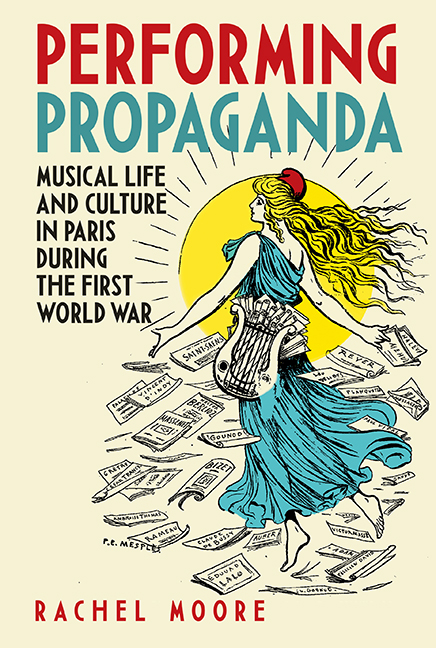 Performing Propaganda: Musical Life and Culture in Paris during the First World War
Performing Propaganda: Musical Life and Culture in Paris during the First World War Book contents
- Frontmatter
- Contents
- List of Illustrations
- List of Tables
- Acknowledgements
- List of Abbreviations
- Introduction
- 1 Musical Institutions on the Home Front
- 2 The Origins of Wartime Musical Propaganda: From the Written Word to Performing Globetrotters
- 3 Saint-Saëns's Germanophilie as a Propaganda Prototype
- 4 Propaganda on the Concert Stage: The Matinées Nationales
- 5 Creativity and Compromise at the Opéra
- 6 Music Publishing and the Édition Française de Musique Classique
- Conclusion
- Bibliography
- Index
- Miscellaneous Endmatter
5 - Creativity and Compromise at the Opéra
Published online by Cambridge University Press: 19 July 2019
- Frontmatter
- Contents
- List of Illustrations
- List of Tables
- Acknowledgements
- List of Abbreviations
- Introduction
- 1 Musical Institutions on the Home Front
- 2 The Origins of Wartime Musical Propaganda: From the Written Word to Performing Globetrotters
- 3 Saint-Saëns's Germanophilie as a Propaganda Prototype
- 4 Propaganda on the Concert Stage: The Matinées Nationales
- 5 Creativity and Compromise at the Opéra
- 6 Music Publishing and the Édition Française de Musique Classique
- Conclusion
- Bibliography
- Index
- Miscellaneous Endmatter
Summary
For the moment, the Opéra's performances must not be considered as an entertaining pastime but rather as a gesture of solidarity between staff, the public, and authors … It is not for the sake of rejoicing that it is appropriate to go to hear music, but I repeat, in thoughts of solidarity.
THESE WERE the words of Jacques Rouché, the director of the Opéra, in August 1916, interviewed by a reporter for the periodical La rampe on the subject of the Opéra's first wartime season in 1915–16. Rouché's thoughts encapsulate wider public sentiment in wartime, as explored in Chapter One, that whilst theatregoing was a vital form of distraction during wartime, and a means of escape and entertainment, it also played a crucial role in bringing the Parisian public together and uniting them in the home-front war effort. As Susan McCready notes, public institutions and in particular theatres played a vital role in unifying the French people during the war, and, as literal gathering spaces, they served as important sites of public assembly during wartime.
Rouché was no doubt aware that by 1916 the Opéra had much catching up to do: having staged its final performance of the 1913–14 season on 28 July 1914, the Opéra remained closed until its inaugural wartime matinée performance on 9 December 1915. As Chapter One has explored, wartime conditions posed numerous practical and financial problems for the Opéra: mobilisation had depleted the institution's forces, leaving a lack of male principals, and a depleted orchestra; wartime shortages made fuel costs high; and, when combined with the large taxes demanded of the institution, keeping the building in operation was financially unviable. The question of what would or could be performed during wartime in order to ensure sufficiently high returns complicated things further. The principal composer whose works had ensured high ticket sales in the pre-war years was Richard Wagner. With the outbreak of war, the works of this ‘enemy’ composer became problematic, leaving the Opéra with a sizeable gap in its repertoire. Rouché outlined his fears regarding programming in a letter to Albert Dalimier, the under-secretary for fine arts, in December 1914: ‘You know, Minister, how important the Wagnerian repertoire was for the successful management of the Opéra.
- Type
- Chapter
- Information
- Performing Propaganda: Musical Life and Culture in Paris during the First World WarMusical Life and Culture in Paris during the First World War, pp. 139 - 172Publisher: Boydell & BrewerPrint publication year: 2018
